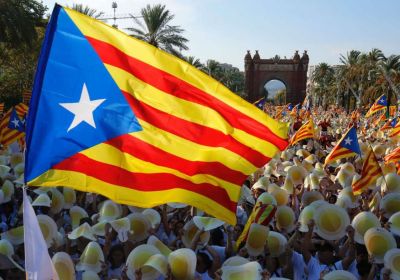-
-
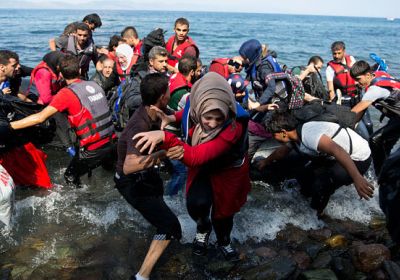 The Spanish parliament was the scene of a sharp clash on April 6 over the March 18 European Union-Turkey “pact of shame” that will return up to 50,000 asylum seekers from Greece to Turkey. The asylum seekers — most fleeing from the Syrian civil war — will then be placed in an archipelago of detention centres. Acting Spanish prime minister Mariano Rajoy, of the conservative People's Party (PP), defended the agreement, saying “things are getting better, we have a procedure”.
The Spanish parliament was the scene of a sharp clash on April 6 over the March 18 European Union-Turkey “pact of shame” that will return up to 50,000 asylum seekers from Greece to Turkey. The asylum seekers — most fleeing from the Syrian civil war — will then be placed in an archipelago of detention centres. Acting Spanish prime minister Mariano Rajoy, of the conservative People's Party (PP), defended the agreement, saying “things are getting better, we have a procedure”. -
 All media outlets in the Spanish state were dominated by the images of two men on March 1: one was leaving jail near the northern city of Logrono to the cheers of inmates he was leaving behind; the other was trying to convince the Spanish parliament in Madrid to vote him in as prime minister.
All media outlets in the Spanish state were dominated by the images of two men on March 1: one was leaving jail near the northern city of Logrono to the cheers of inmates he was leaving behind; the other was trying to convince the Spanish parliament in Madrid to vote him in as prime minister.
-
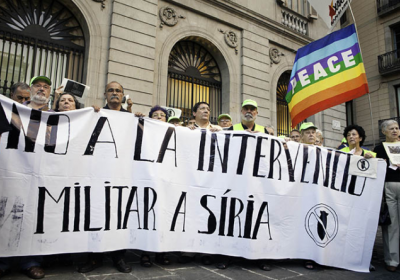 The statement below was released by four mayors of cities in the Spanish state — Barcelona, Cadiz, Zaragoza and A Coruna — and signed by many well-known figures from Spanish media and culture. It was translated for Green Left Weekly by Dick Nichols. * * * The brutal attacks in Paris on November 13 were designed to install a climate of terror in the population, raising walls of suspicion and hatred between neighbours, shattering community life and bringing the politics of fear into our daily lives.
The statement below was released by four mayors of cities in the Spanish state — Barcelona, Cadiz, Zaragoza and A Coruna — and signed by many well-known figures from Spanish media and culture. It was translated for Green Left Weekly by Dick Nichols. * * * The brutal attacks in Paris on November 13 were designed to install a climate of terror in the population, raising walls of suspicion and hatred between neighbours, shattering community life and bringing the politics of fear into our daily lives. -
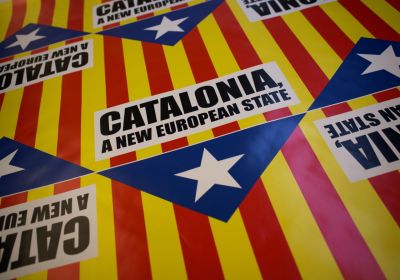 The ongoing war without guns between the Spanish state and Catalonia entered a critical new phase on October 27. On that day, the newly elected pro-independence majority in the Catalan parliament published a draft bill that “solemnly declared the start of the process of creating an independent Catalan state in the form of a republic”.
The ongoing war without guns between the Spanish state and Catalonia entered a critical new phase on October 27. On that day, the newly elected pro-independence majority in the Catalan parliament published a draft bill that “solemnly declared the start of the process of creating an independent Catalan state in the form of a republic”. -
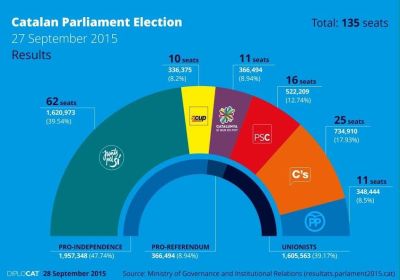 Who won the September 27 elections for the Catalan parliament, called as a substitute for the Scottish-style independence referendum that the Spanish People's Party (PP) government refuses to allow? It depends who you ask. On the night, most commentators on Madrid-based TV and radio called the result a defeat for the pro-independence camp: its two tickets — the mainstream nationalist Together for Yes and the anti-capitalist People's Unity Candidacies (CUP) - won only 47.74% of the vote against 52.26% for “the rest”.
Who won the September 27 elections for the Catalan parliament, called as a substitute for the Scottish-style independence referendum that the Spanish People's Party (PP) government refuses to allow? It depends who you ask. On the night, most commentators on Madrid-based TV and radio called the result a defeat for the pro-independence camp: its two tickets — the mainstream nationalist Together for Yes and the anti-capitalist People's Unity Candidacies (CUP) - won only 47.74% of the vote against 52.26% for “the rest”. -
 More than 1 million people took part in a pro-independence march in Barcelona on September 11, Catalonia's national day.
A year has passed since the British establishment won the September referendum on Scottish independence with a final campaign week of blackmail, dirty tricks and multi-party sworn promises yet to be kept.
More than 1 million people took part in a pro-independence march in Barcelona on September 11, Catalonia's national day.
A year has passed since the British establishment won the September referendum on Scottish independence with a final campaign week of blackmail, dirty tricks and multi-party sworn promises yet to be kept.
-
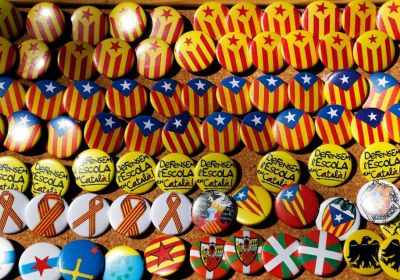
If a Catalan Rip Van Winkle were to wake up today after a sleep of only six years, his disorientation with Catalonia would be as great as that of the original Rip Van Winkle after he dozed right through the American War of Independence. “Am I hallucinating?” he might ask, struggling to find the right answer to questions like:
-
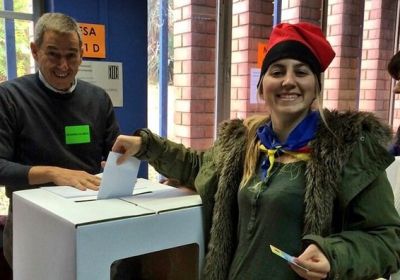 On November 9, 2.305 million residents of Catalonia defied a November 4 Spanish Constitutional Court ruling and voted on what future political status they wanted for their country, now one of the 17 “autonomous communities” (regions) within the Spanish state. Because of their rebellion — festive but determined — it was not just another voting day. Initiative for Catalonia-Greens (ICV) co-coordinator Joan Herrera called it “the biggest demonstration in the history of this country”.
On November 9, 2.305 million residents of Catalonia defied a November 4 Spanish Constitutional Court ruling and voted on what future political status they wanted for their country, now one of the 17 “autonomous communities” (regions) within the Spanish state. Because of their rebellion — festive but determined — it was not just another voting day. Initiative for Catalonia-Greens (ICV) co-coordinator Joan Herrera called it “the biggest demonstration in the history of this country”. -
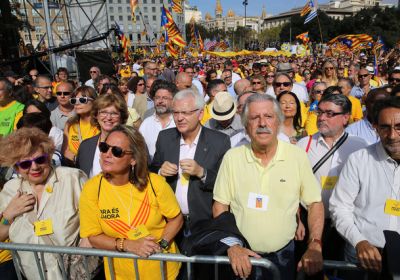 Millions of residents of Catalonia will indicate their preference for the future political status of their country, one of the 17 “autonomous communities” (regional governments) within the Spanish state, in the November 9 Catalan “participatory process”. The “process” will present voters with the same ballot paper as the original non-binding consultation adopted by the Catalan parliament on September 26 — which was immediately suspended by the Spanish Constitutional Court. Its asks: “(1) Do you want Catalonia to become a state? (2) If yes, do you want that state to be independent?”
Millions of residents of Catalonia will indicate their preference for the future political status of their country, one of the 17 “autonomous communities” (regional governments) within the Spanish state, in the November 9 Catalan “participatory process”. The “process” will present voters with the same ballot paper as the original non-binding consultation adopted by the Catalan parliament on September 26 — which was immediately suspended by the Spanish Constitutional Court. Its asks: “(1) Do you want Catalonia to become a state? (2) If yes, do you want that state to be independent?”
Catalonia
Catalonia
